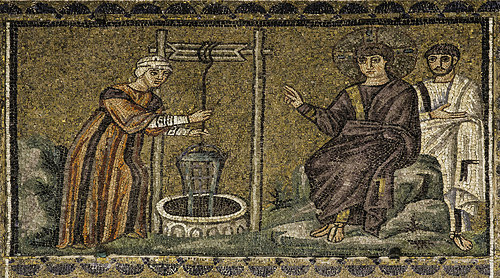We run our website the way we wished the whole internet worked: we provide high quality original content with no ads. We are funded solely by your direct support. Please consider supporting this project.

God is Different Than You Think
The revelation of “[a] God humiliated even unto the cross,” as Pascal put it, flies in the face of what most Jews of Jesus’ time, and of what most people throughout history, have expected God to be. In this light, we can discern the thematic centrality of the cross in Jesus’ many teachings that reverse common expectations about God.
For example, few people in Jesus’ day would have expected God to “justify” a tax collector who was too ashamed to “even look up to heaven” (Lk 18:13) instead of the righteous Pharisee who fasted twice a week, gave a tenth of all he earned to God, and thanked God he was not like “robbers, evildoers, adulterers” or “this tax collector” (vss. 11-2). Similarly, few if any expected God to welcome into his kingdom “tax collectors and prostitutes” before religious leaders whom everyone held in high esteem (Mt 21:31; cf., Lk 7:38-50). Indeed, because the God he revealed was so contrary to what people expected, Jesus repeatedly taught that those whom most assumed were “outsiders” would find themselves “inside,” while those whom most assumed were “insiders” would find themselves “out” (e.g., Mt 7:21-3; 22:1-9; 25:31-46). All of these anticipate the great reversal of the cross, where God entered into total solidarity with “outsiders” by becoming a crucified “outsider.”
Along the same lines, not many in Jesus’ day would have expected God to “leave in an open country” the ninety-nine sheep who were where they belonged to search for the one that got lost, and to then throw a neighborhood party to celebrate its rescue once he found it (Lk 15:3-7). Nor would they have thought God would be like a father who persistently looked for his wayward son to return home, despite the fact that this son had brought him shame by demanding, and then squandering, his entire inheritance (Lk 15:11-20). Still less would have expected God to be like this father as he joyfully ran to welcome his son “while he was still a long way off,” hugging and kissing him once he got there, restoring his status as son by placing the family robe and ring on him, and then throwing a large feast over his return, all without requiring so much as an apology for his actions (vss. 20-4). The God whose mercy shocks our sensibilities as he identifies with sinners on the cross was already shocking people’s sensibilities by identifying with “tax collectors and sinners” (e.g., Lk 15:1-2; cf., Mt 9:10-1; 11:19).
In addition, we can discern the character of the cross as well as harbingers of the cross not only in Jesus’ teachings, but also in his actions. To give just a few illustrations, Jesus’ successful battle against the devil’s temptations in the desert anticipates his final victory over Satan on the cross (Mt 4:1-11). So too, the battle Jesus continually waged against the kingdom of darkness by delivering people from demonic oppression anticipates his victory over this renegade kingdom on the cross, which has justifiably been called “the grand exorcism.”
On a different note, the manner in which Jesus’ love led him to serve and engage with people in ways that shocked the religious establishment of his day anticipates the shocking non-discriminating love of God revealed on Calvary. For example, Jesus rebelled against social norms by the dignified way he served, interacted with, and even touched, lepers as well as other “unclean” people (e.g., Mt 8:1-3; 9:20-2; 10:8; 11:5; 26:6). So too, the manner in which Jesus served and engaged with the poor, the oppressed, people with infirmities (who were generally deemed to be afflicted by God), and women—even women with shameful pasts—violated first century Jewish social taboos as well.
Not only this, but the way Jesus consistently put the welfare of people before the meticulous observance of the law, offended the religious sensibilities of the status quo and in this way anticipates the religiously offensive love of God revealed on Calvary, when the “legal indebtedness” of all people was “nailed to the cross” (Col 2:15, cf., 16-7). And finally, the gracious manner in which Jesus interacted with, and spoke about, people whom most in his Jewish audience despised (e.g., Samaritans, Roman Centurions), sometimes holding them up as more exemplary than his fellow Israelites, was deeply countercultural and offensive (Mt 8:5-13; 15:21-8; Lk 10:25-37).
Behaviors such as these anticipate the wholly unexpected revelation of God on the cross, in which God’s love demolished “the dividing wall of hostility” between people groups in order to “create in himself one new humanity” (Eph 2:14-5). The shocking all-inclusive love Jesus demonstrated throughout his life, in other words, was summed up in, and most perfectly expressed by, the shocking all-inclusive love revealed on Calvary.
Image by Lawrence OP via Flickr
Category: General
Tags: Crucifixion, God, Jesus, Love, Sacrifice
Topics: Attributes and Character
Related Reading

“Whatever it means, it cannot mean that.”
pure9 via Compfight Roger Olson wrote a great article a couple of days ago entitled Why (High) Calvinism Is Impossible. He points out that there is no way to understand God as “good” while also believing in double predestination. The idea that God predestines some to heaven and a vast majority to hell for his “glory”…

Don’t Be a Functional Atheist at Christmas
All of us raised in Western culture have been strongly conditioned by what is called a secular worldview. The word secular comes from the Latin saeculum, meaning “the present world.” A secular worldview, therefore, is one that focuses on the present physical world and ignores or rejects the spiritual realm. To the extent that one…

Finding an Alternative Jesus
The “Newly Discovered” Jesus One of the most common, and most disturbing, refrains heard in the media’s coverage of contemporary radical views of Christ is that New Testament scholars have recently “discovered” new sources of information about Jesus that contradict the Bible’s own view of Jesus. It is claimed that works such as the Gospel…

Do you believe God is pure actuality?
The basis of the classical view of God as pure actuality (actus purus) is the Aristotelian notion that potentiality is always potential for change and that something changes only because is lacks something else. So, a perfect being who lacks nothing must be devoid of potentiality, which means it must be pure actuality. I think…

What Happened on the Cross?
Since the time of Anselm (11th century), and especially since the Reformation in the 16th century, the tendency of the Western church has been to focus almost all of its attention on the anthropological dimension of the atonement, usually to the neglect of the cosmic dimension that is central to the NT. In the standard…
